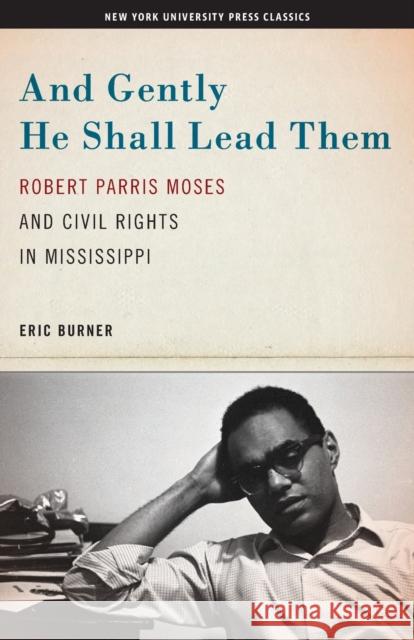And Gently He Shall Lead Them: Robert Parris Moses and Civil Rights in Mississippi » książka
And Gently He Shall Lead Them: Robert Parris Moses and Civil Rights in Mississippi
ISBN-13: 9780814712504 / Angielski / Miękka / 1995 / 308 str.
And Gently He Shall Lead Them: Robert Parris Moses and Civil Rights in Mississippi
ISBN-13: 9780814712504 / Angielski / Miękka / 1995 / 308 str.
(netto: 125,13 VAT: 5%)
Najniższa cena z 30 dni: 124,19
ok. 22 dni roboczych.
Darmowa dostawa!
-This moving account of a key figure in American history contributes greatly to our understanding of the past. It also informs our vision of the servant leader needed to guide the 1990s movement.-
--Marian Wright Edelman, President, Children's Defense Fund -First-rate intellectual and political history, this study explores the relations between the practical objectives of SNCC and its moral and cultural goals.-
--Irwin Unger, Author of These United States and Postwar America -Robert Moses emerges from these pages as that rare modern hero, the man whose life enacts his principles, the rebel who steadfastly refuses to be victim or executioner and who mistrusts even his own leadership out of commitment to cultivating the strength, self-reliance, and solidarity of those with and for whom he is working. Eric Burner's engrossing account of Robert Moses's legendary career brings alive the everyday realities of the Civil Rights Movement, especially the gruelling campaign for voter registration and political organization in Mississippi.-
--Elizabeth Fox-Genovese, Eleonore Raoul Professor of the Humanities, Emory University, author of Within the Plantation Household: Black and White Women of the Old South Next to Martin Luther King, Jr. and Malcolm X, Bob Moses was arguably one of the most influential and respected leaders of the civil rights movement. Quiet and intensely private, Moses quickly became legendary as a man whose conduct exemplified leadership by example. He once resigned as head of the Council of Federated Organizations because -my position there was too strong, too central.- Despite his centrality to the most important social movement in modern American history, Moses' life and the philosophy on which it is based have only been given cursory treatment and have never been the subject of a book-length biography. Biography is, by its very nature, a complicated act of recovery, even more so when the life under scrutiny deliberately avoids such attention. Eric Burner therefore sets out here not to reveal the -secret- Bob Moses, but to examine his moral philosophy and his political and ideological evolution, to provide a picture of the public person. In essence, his book provides a primer on a figure who spoke by silence and led through example. Moses spent almost three years in Mississippi trying to awaken the state's black citizens to their moral and legal rights before the fateful summer of 1964 would thrust him and the Freedom Summer movement into the national spotlight. We follow him through the civil rights years -- his intensive, fearless tradition of community organizing, his involvements with SNCC and the Mississippi Freedom Democratic Party, and his negotiations with the Department of Justice --as Burner chronicles both Moses' political activity and his intellectual development, revealing the strong influence of French philosopher Albert Camus on his life and work. Moses' life is marked by the conflict between morality and politics, between purity and pragmatism, which ultimately left him disillusioned with a traditional Left that could talk only of coalitions and leaders from the top. Pursued by the Vietnam draft board for a war which he opposed, Moses fled to Canada in 1966 before departing for Africa in 1969 to spend the next decade teaching in Tanzania. Returning in 1977 under President Carter's amnesty program, he was awarded a five-year MacArthur genius grant in 1982 to establish and develop an innovative program to teach math to Boston's inner-city youth called the Algebra Project. The success of the program, which Moses has referred to as our version of Civil Rights 1992, has landed him on the cover of The New York Times Magazineemphasizing the new, central dimension that math and computer literacy lends to the pursuit of equal rights. And Gently He Shall Lead Them is the story of a remarkable man, an elusive hero of the civil rights movement whose flight from adulation has only served to increase his reputation as an intellectual and moral leader, a man whom nobody ever sees, but whose work is always in evidence. From his role as one of the architects of the civil rights movement thirty years ago to his ongoing work with inner city children, Robert Moses remains one of America's most courageous, energetic, and influential leaders. Wary of the cults of celebrity he saw surrounding Martin Luther King, Jr. and Malcolm X and fueled by a philosophy that shunned leadership, Moses has always labored behind the scenes. This first biography, a primer in the life of a unique American, sheds significant light on the intellectual and philosophical worldview of a man who is rarely seen but whose work is always in evidence.











